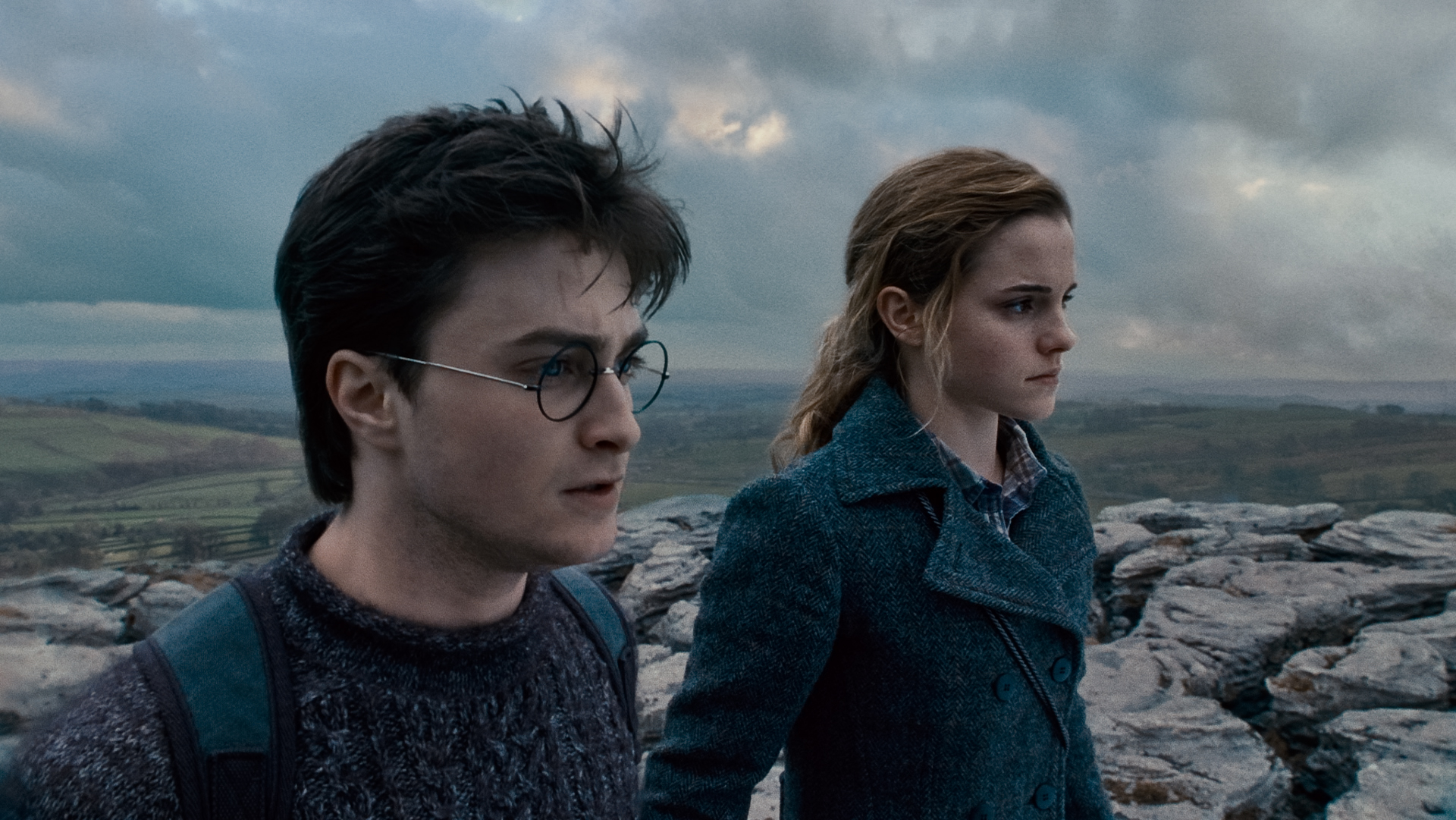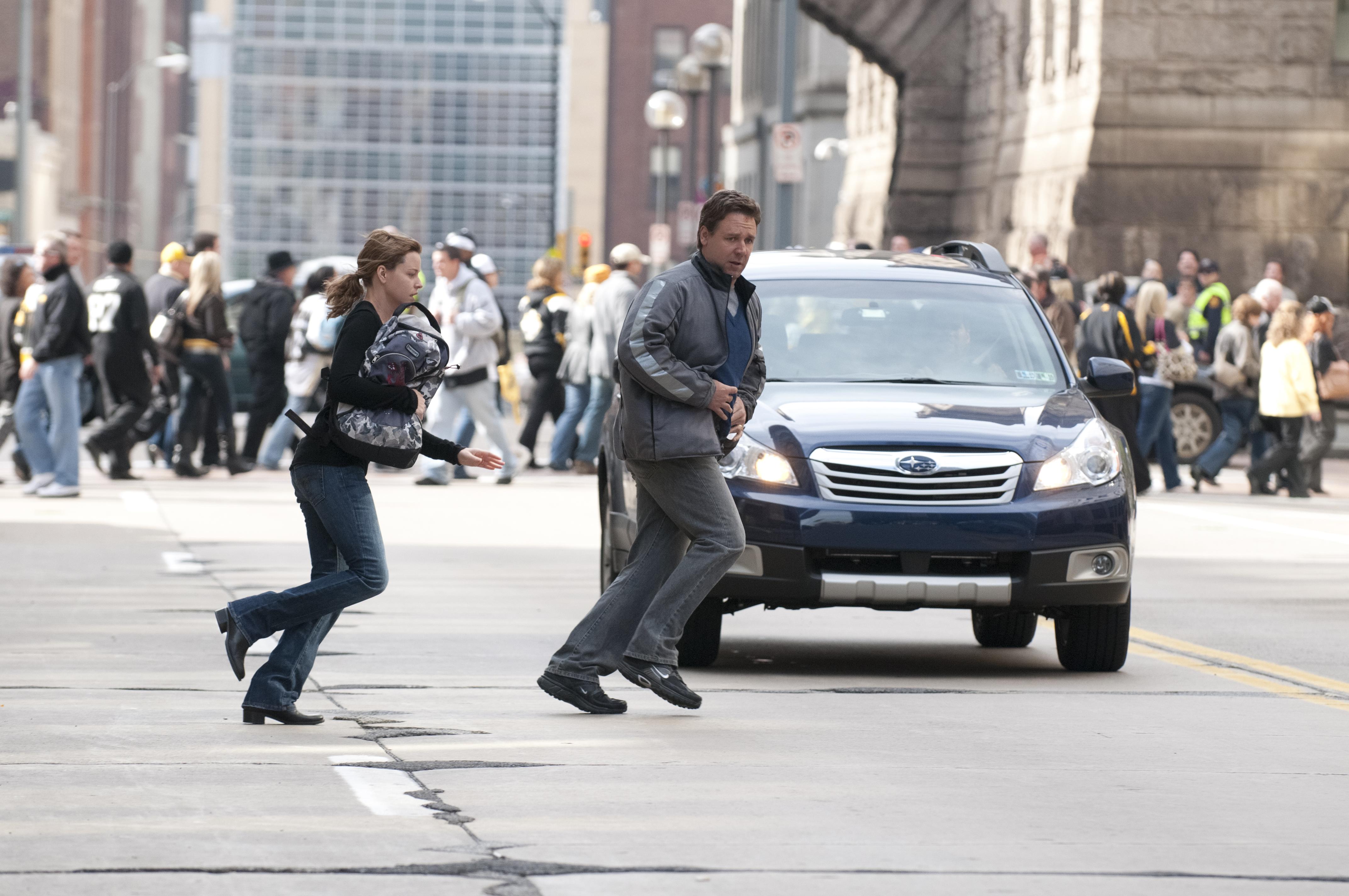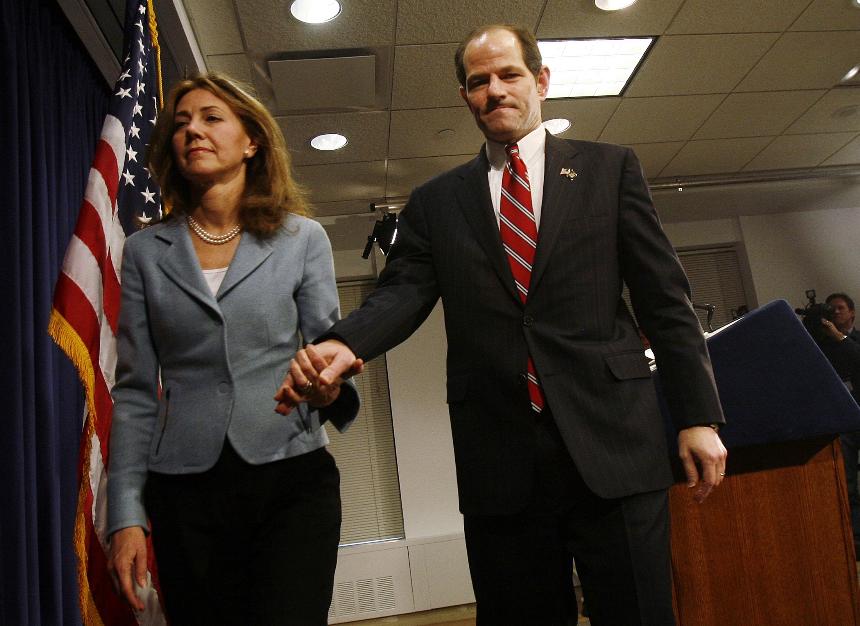Opening Weekend: Harry Potter, The Next Three Days, Client 9
Emma Watson rules a road movie about boys and their wands
Daniel Radcliffe and Emma Watson in ‘Harry Potter and the Deathly Hallows: Part I’ (Photo/Warner Bros. Pictures)
Share

This weekend’s menu offers three movies about guys consumed by a sense of mission. The big ticket item is the penultimate movie about that Potter boy. By now, he knows he’s the Chosen One, like Frodo near the end of The Lord of the Rings, and like Frodo he’s now trekking across wild landscapes to save the world, though at a more leisurely pace. There’s another big difference: a girl seems to be in charge. Only slightly less far-fetched is The Next Three Days, a new movie from Canadian director Paul Haggis, starring Russell Crowe as a mild-mannered mastermind on an obsessive quest to spring his wife from prison. The line between good and evil is more elusive in Client 9: The Rise and Fall of Eliot Spitzer, a saga of a crusader who acted like the Chosen One, trying to slay the Dark Lords of Wall Street, only to be taken down in what looks like a set up—at least that’s the picture that emerges from this vital investigative documentary, which is the one must-see movie of the three, unless you’re a Potterhead.
Harry Potter and the Deathly Hallows: Part I
Full disclosure. I have not read the Harry Potter books, or even seen all the movies. Now I feel like a hockey fan who ignores regular season play then watches the playoffs. Or comes on board just for the seventh game of the Stanley Cup final. But I do know this. The last two Harry Potter movie, based on the seventh and final book of J.K. Rowling’s blockbuster series, are a huge deal. I’ve been reminded of this on a regular basis since at least the spring by a rabid Potter fan in the office. On Monday, she and two other Potterheads from the Maclean’s newsroom joined me at the Toronto premiere of Harry Potter and the Deathly Hallows Part I. That required an expedition to a multiplex that loomed like a space station from the strip-mall mesas of suburban Etobicoke, the heart of Rob Ford country. The field-trip vibe was fitting, as it turned out, because the new Potter film is basically a road movie full of barren wilderness vistas.
In this episode, Harry and friends, who are by now a mess of raging hormones, leave the Hogwarts School of Witchcraft and Wizardry behind and spend much of the movie camping—raising their tent in epic landscapes. By the way, the reason Warner Bros. dragged us to the outer reaches of Etobicoke was to show off the film in a newfangled Cineplex theatre with a wall-to-wall screen and a system called UltraAVX, which plays Dolby 7.1 stereo. (I don’t know about you, but I’ll be satisfied only when technology gives me a separate audio channel for every pixel: Dolby 2000000.1) Anyway, I could feel the bass sound effects vibrate my pant leg, so the audio was definitely up to snuff. And the movie? Well, because I’m not a devotee, unlike most of the fans who will be packing theatres this weekend, for me it’s just a movie. And although the pacing sometimes lagged over the course of two-and-a-half hours, it’s an enjoyable ride, with a few spectacular set pieces, and consistently engaging performances from its the franchise’s three lead actors-in-residence.
This is the darkest and most violent of the Harry Potter movies, which I’m told is consistent with the evolution of the books toward more mature terrain. It’s rated PG-13, and parents should be wary of dragging small children off to see it. As usual, it’s a pleasure to see every working actor in England cast in one movie, notably Ralph Fiennes, who makes a meal of his satanic role as Voldemort, Helena Bonham Carter as his obsequious disciple Bellatrix, Alan Rickman as the tragically complicated Snape, Brendan Gleeson as the piratical Mad-Eye Moody, Bill Nighy as the world-weary Minister of Magic Rufus Crimgeour, and Imelda Staunton as its venal bureaucrat.
David Yates, who has directed the lion’s share of the series, creates its Dickensian world with lavish detail. The Ministry’s black-tiled headquarters is an Orwellian vision worthy of fascism, where wizard supremacy conducts police-state purges under the slogan “Magic is Might.” But the movie’s pièce-de-résistance is a stand-alone sequence of animation used to illustrate the Three Brothers fable in The Tales of Beetle the Bard. It’s done in a Tim Burton-like style of shadow puppetry and is truly exquisite. The only problem is its artistry puts to shame the special effects “magic” that is the film’s main event, as Hermione and the boys slog through their quest to destroy the Horcruxes and subvert Voldemort. The big effects are well done, but they are essentially generic, just another day in the life of a Hollywood blockbuster.
What’s unique about the Potter franchise is the extraordinary range of characters. And the three leads, who have literally grown up with the franchise, have a natural chemistry. What surprised me about this movie is that it doesn’t belong to its eponymous hero; it belongs to Emma Watson, who plays the brainy Hermione. She gets the meat of the dialogue, and rules every scene she’s in. When you come down to it, Deathly Hallows Part I is a chick flick. And maybe it’s just Watson’s steely focus and strong brow, but I was struck by her resemblance to Kristen Stewart, star of the Twilight franchise. I realize this comparison may seem like sacrilege, given that Twilight is dreck compared to Potter. But, as in the latest Twilight movie, we have a naïve love triangle in the woods, complete with some giggly double entendres about 10-inch wands. In this case, however, there’s no erotic subterfuge between Harry (Daniel Radcliffe) and Hermione, except in the paranoid imagination of her suitor, the sweet, stalwart Ron (Rupert Grint). The much touted “nude” scene between them is just a fussy mirage, an evil spell.
That’s too bad, because the drama would have more muscle if there was some heavier personal drama to match the cosmic intrigue. With both the Twilight and Potter franchises, however, the filmmakers don’t dare muck with the plot except for demands of concision, for fear of alienating their captive audience of readers, not to mention the authors, who ride herd over the scripts in both cases. But great movie adaptations often succeed by creatively violating their source material, and transforming it—allowing the film to find its own magic. What may ultimately limit the Potter series is its dogged fidelity to its source.
The Next Three Days

These days it seems the ultimate test of a relationship is to spring your loved one out of prison when he or she is serving time for murder. Earlier this fall, we saw Hillary Swank starring in Conviction, based on the real-life story of Betty Ann Waters, who earned a law degree to free a brother serving life. Now, in a fictional thriller scripted by director Paul Haggis (Crash)—and adapted from the French film Pour Elle—Russell Crowe plays a Pittsburgh community college professor named John, whose wife, Lara (Elizabeth Banks), is suddenly thrown in jail for killing her boss—a crime that she may or may not have committed. But unlike Swank’s character, he doesn’t spend half his life trying to get her out of jail. Once he exhausts the legal channels, and sets up his elaborate plot, he has only three days to engineer her great escape, from the outside-in, before she’s transferred to another facility. The story unfolds like a heist movie, in which our hero is trying to “steal” his wife from a maximum security prison, concocting a byzantine plan that no one knows about, including his wife. Haggis’ script, like John’s scheme, is mined with decoys and diversions. But the diabolically intricate escape plot makes for a diabolically contrived narrative plot. How John finds the time to plot the escape while teaching a full course load and serving as a single father to a young boy escapes me. And why his boy never asks questions about the myriad charts, maps and plans that are pasted up on his father’s study wall is also a mystery. But ours is not to question why. Just buckle up and follow the action.
The Next Three Days is a slim, trim, fast-moving one-man movie. I found myself getting caught up in the action, then hating myself in the morning for being its pawn. Crowe keeps his head down and cranks up the requisite intensity for the role. He makes the movie more than watchable. So does Elizabeth Banks, who carves some intriguing corners out of a constrictive role, and her impulsive personality keeps us guessing about her guilt or innocence. But Haggis’s squeaky-clean moral choices are so uninteresting. If Crowe’s character has to kill someone in the course of his mission, it will have to be a scumbag drug dealer. And his secondary characters are so flat they’re almost zombie-like—such as Olivia Wilde (House, TRON: Legacy), stuck in a dead-end role as single mom who befriends our hero in the playground and becomes an unwitting part of his scheme. And John’s son, a page-boy blond played by eight-year-old Ty Simpkins, is so sulky and passive he’s almost catatonic. But maybe he’s method-acting, playing out his boredom at being cast as an adorable piece of baggage whose only job is to look cute.
Client 9: The Rise and Fall of Eliot Spitzer

In a year loaded with powerful documentaries, this astounding film is one of the most vital. Charles Ferguson’s Inside Job tackled a much larger canvas—with a sweeping exposé of the dark forces behind the 2008 financial meltdown, it amounted to a 21st-century Das Kapital of whodunnits. But with Client 9, Alex Gibney—the Oscar-nominated director of Taxi to the Dark Side and Enron: The Smartest Guys in the Room—zeroes in one one particular and notorious case that illuminates the moral bankruptcy of the rich and powerful, and the gross distortions of the American media. The film falls short of actually pushing a conspiracy theory. But it marshals some highly compelling evidence to suggest that former New York Governor Eliot Spitzer was not just punished for his own gross misconduct, as an A-type consumer of high-priced hookers, but that he was taken down by Wall Street titans who were committing grand larceny, and were royally pissed at his gunslinger campaign against them.
Gibney interviews Spitzer, his friends—and his enemies, who are all too eager to appear on camera and gloat over his downfall. We also hear from women associated with the high-end escort agency that Spitzer frequented. Gibney doesn’t get access to the infamous Ashley Dupre, who became the self-promoting poster girl for the scandal. But she, as it turns out, was just a one-night fling, brought in from bench by the escort service when a regular was unavailable. It was Dupre, however, who gave the story traction, supplying the media with a face and a voice to titillate the public. The film suggests that she may have been part of a high-powered attempt to bring Spitzer down. And even without the conspiracy, in the grand scheme of things, the non-crime of hiring prostitutes seems like small potatoes next to defrauding millions of investors and ruining the world economy.
Because Gibney doesn’t indulge in the kind of rhetoric and hyperbole that we’d see in a Michael Moore documentary or an Oliver Stone drama, his argument is that much more persuasive. And he makes no attempt to redeem Spitzer as a human being. Yes, the disgraced former governor does agree to be interviewed on camera. And as he struggles to explain his behavior, without trying to justify it, he looks highly uncomfortable, and not very likable. Unlike Bill Clinton, another liberal statesman who suffered massive public embarrassment for his private indiscretions, Spitzer has no charm. His strong suit was being brash and abrasive. And now he comes across as an unsavory, haunted man who’s trying to crawl his way out of a deep hole of humiliation. But even without liking him, by the end of this movie we become convinced that this latter-day Eliot Ness, no matter how flawed as a human being, was embarked on a heroic, if quixotic, mission—to root out the kind of endemic corruption that would trigger the financial meltdown. He seems to have felt he was untouchable, which makes him a victim of hubris, and extreme naïveté—unless, like so many powerful men who compartmentalize their dark side, he secretly wanted to get caught.